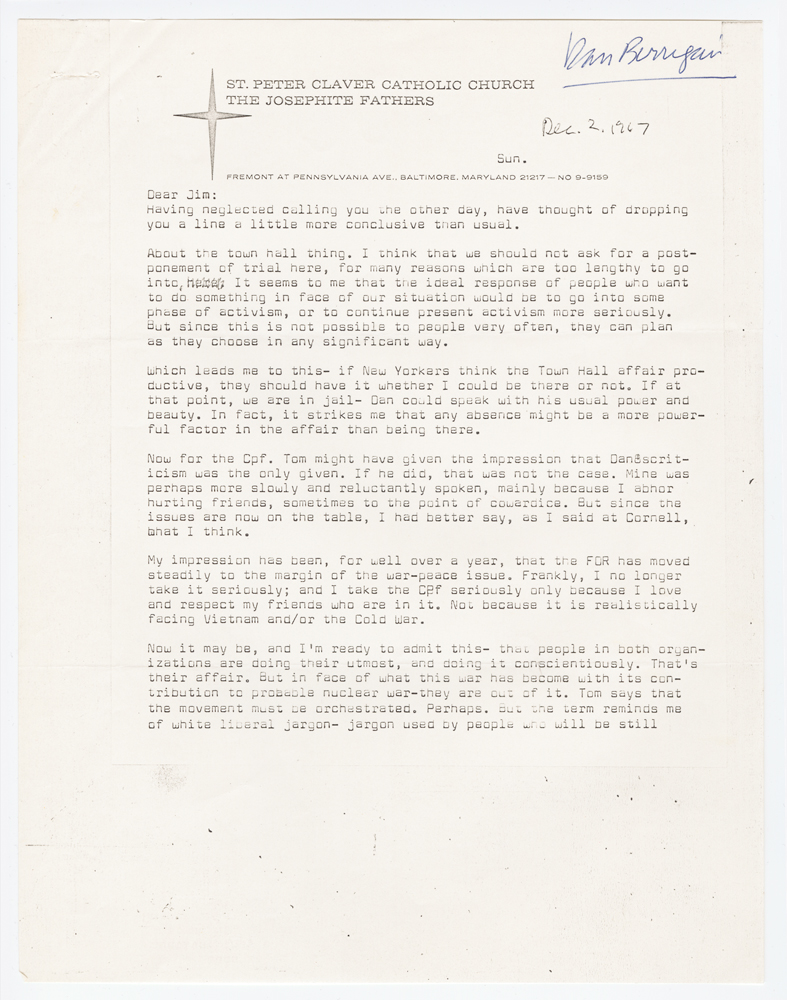 |
Letter from Philip Berrigan to Jim, December 2, 1967
 |
1 / 3 |
 |



| Collection: |
Cornell University Library |
| Date: |
1967-12-02 |
| Date of Digitization: |
2004 |
| Source: |
Daniel and Philip Berrigan Collection at the Division of Rare and Manuscript Collections, Cornell University Library |
| Original Dimensions: |
? |
| Creator: |
Berrigan, Philip, 1923-2002 |
|
|
Description:
In the letter, probably to James Forest (one of the leaders of FOR and CPF), Philip Berrigan refers to the differences between the antiwar actions taken by himself and Daniel Berrigan, among others, and those of Fellowship of Reconcilliation and Catholic Peace Fellowship. He calls actions of both of the organizations as timid, over cautious and ineffective, in contrast to those taken by himself and his brother, where personal sacrifice, risk and suffering were required. He states that in these times only decisive protests are heard and taken into account, not the reluctant ones. He withdraws his support to both of the organizations.
Transcription: ST. PETER CLAVER CATHOLIC CHURCH
THE JOSEPHITE FATHERS
Dec. 2, 1967
Sun.
FREMONT AT PENNSYLVANIA AVE., BALTIMORE. MARYLAND 21217 — NO 9-9159
Dear Jim:
Having neglected calling you the other day, have thought of dropping
you a line a little more conclusive than usual.
About the town hall thing. I think that we should not ask for a postp-
onement of trial here, for many reasons which are too lengthy to go
into here. It seems to me that the ideal response of people who want
to do something in face of our situation would be to go into some
phase of activism, or to continue present activism more seriously.
But since this is not possible to people very often, they can plan
as they choose in any significant way.
Which leads me to this- if New Yorkers think the Town Hall affair pro-
ductive, they should have it whether I could be there or not. If at
that point, we are in jail- Dan could speak with his usual power and
beauty. In fact, it strikes me that any absence might be a more power-
ful factor in the affair than being there.
Now for the Cpf. Tom might have given the impression that Dan’s crit-
icism was the only given. If he did, that was not the case. Mine was
perhaps more slowly and reluctantly spoken, mainly because I abhor
hurting friends, sometimes to the paint of cowardice. But since the
issues are now on the table, I had better say, as I said at Cornell,
what I think.
My impression has been, for well over a year, that the FOR has moved
steadily to the margin of the war-peace issue. Frankly, I no longer
take it seriously; and I take the Cpf seriously only because I love
and respect my friends who are in it. Not because it is realistically
facing Vietnam and/or the Cold War.
Now it may be, and I’m ready to admit this- that people in both organ-
izations are doing their utmost, and doing it conscientiously. That’s
their affair. But in face of what this war has become with its con-
tribution to probable nuclear war-they are cut of it. Tom says that
the movement must be orchestrated. Perhaps. But the term reminds me
of white liberal jargon- jargon used by people who will be still
|




